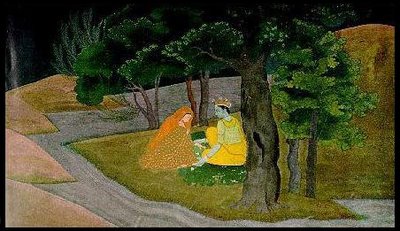
O estilo kangra floresceu na Índia no século XVIII. Embora se possa notar aqui e ali a influência do estilo mogol, as miniaturas kandra têm um estilo muito próprio e determinaram a história da pintura na Índia. A palavra "mogol" de origem persa designa "mongol", mas, no contexto da história indiana, traduz antes uma estranha simbiose civilizacional entre o Islão e antiga Índia. O tolerante Akbar é o exemplo perfeito do monarca islâmico fascinado pelas "cores" da Índia. Não conheço o significado desta pintura, mas certamente Krishna (ou o seu alter ego, Rama) deve encontrar-se lá (pela sua cor azul). E onde se encontra Krishna, não só está a "vitória", mas, também, a sua amante Radha (ou a sua alter ego, Sita).

1 comentário:
The painting illustrates the following verse from Canto XII of the Gita Govinda:
gatavati sakhivrindem
andatrap abharanir bhara
smara parava sakutasphita
smitasnapi tadharam
sarasamanasam drishtva
radham muhurnavapallava
prasavagayane nikshiptak
shimuvacha harih priyam
kisalaya sayanatale kuru kamini
charananalina vinivesam
tava padapalla vavairipara bhavam
idamanu bhavatu suvesam
"Tears of joy gushed in a stream from the full eyes of Radha and their watery glances beamed. on her best beloved. Even shame, which had lingered in her downcast eyes was itself ashamed and departed, when the fawn-eyed Radha, gazed on the brightened face of Krishna, while she passed by the soft edge of his couch and the bevy of her attendant nymphs warily retired from the bower.
Govinda, seeing his beloved cheerful, her lips sparkling with smiles, and her eyes speaking desire, thus eagerly addressed her; while she carelessly reclined on the leafy bed strewn with soft blossoms: 'Set the lotus of thy foot on this azure bosom; and let this couch be victorious over all, who rebel against love.
(Gita Govinda,the most popular sanskrit poetry of 12th Century, was written by a poet Jayadev, who born near the village Kenduli, now in Orissa , India)
With a kiss to Bhixma
Enviar um comentário